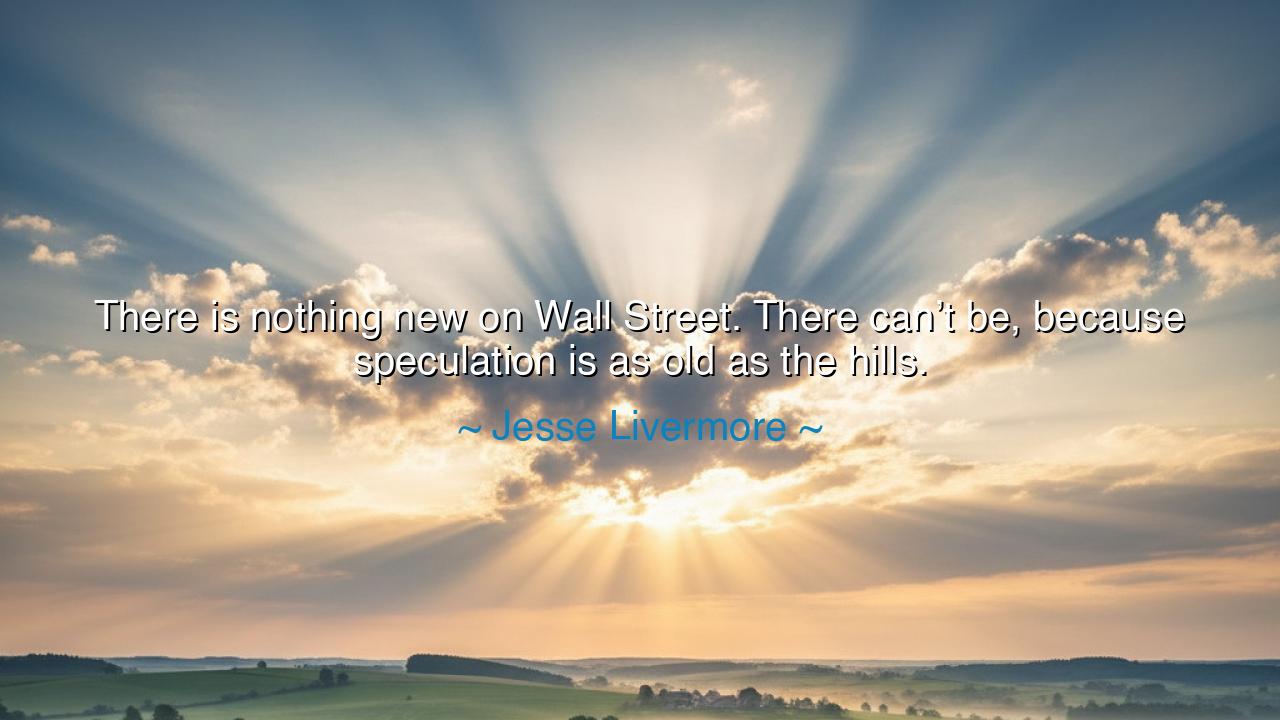
There is nothing new on Wall Street. There can’t be, because
There is nothing new on Wall Street. There can’t be, because speculation is as old as the hills.






When Jesse Livermore declared, “There is nothing new on Wall Street. There can’t be, because speculation is as old as the hills,” he stripped the veil from one of mankind’s oldest illusions—that we are ever truly inventing something wholly unprecedented in the realm of desire, fear, and greed. His words remind us that though markets may evolve in form, though machines may replace paper, though the names of companies may change, the heartbeat of speculation remains the same. It is the pulse of human nature itself, eternal and unchanging.
The meaning is clear: markets are not merely numbers, nor are they mechanical structures governed by logic alone. They are living reflections of human impulses—hope for gain, fear of loss, and the eternal temptation of risk. What was seen in the tulip mania of the 1600s, when the Dutch bid fortunes for flowers, is the same spirit that drove men to gamble on railroads in the 1800s, technology in the 1990s, or digital currencies in our own age. Each generation believes it faces something new, yet each is caught in the same timeless cycle of speculation.
History echoes this lesson with startling clarity. In ancient Rome, there were frenzied markets for grain and land, fortunes won and lost in sudden turns. In the early 18th century, the South Sea Bubble swelled with promise and collapsed with despair, leaving countless ruined. Centuries later, in 1929, millions rushed to pour their savings into rising stocks, convinced the ascent would never end—until it did, in the crash that shattered dreams and ushered in ruin. Livermore himself foresaw that crash, not because he had invented new wisdom, but because he recognized an ancient pattern repeating: unbridled optimism giving way to panic.
The origin of this truth lies in Livermore’s lifelong observation of human behavior. Known as one of the greatest speculators of his time, he rose and fell with fortunes larger than kingdoms, yet always he returned to the same recognition—that people, not markets, determine outcomes. And people are bound by the same passions today as yesterday. Thus, he concludes, there is “nothing new on Wall Street.” What appears revolutionary is only another mask worn by the eternal drama of human nature.
There is also a profound humility in his words. For they remind us that arrogance is the downfall of traders, investors, and dreamers alike. Each age believes itself wiser, each crowd believes it has escaped the mistakes of the past, each man believes he is the first to find a path to certain wealth. Yet the truth is eternal: speculation has no shortcuts, no guaranteed victories, only risks tempered by patience, knowledge, and discipline. Those who ignore history’s lessons are doomed to repeat its tragedies.
The lesson here reaches beyond finance. It teaches that wherever humans gather—be it in politics, art, business, or war—the same impulses repeat. The hunger for quick reward, the blindness of the crowd, the pride of thinking “this time is different”—all of these lead again and again to downfall. To live wisely is to accept that human nature does not change, and therefore, wisdom must come from discipline, not novelty.
In practical action, this means: when confronted with new opportunities, remember the old. Study the history of markets, of bubbles, of crashes. Ask not whether something is truly new, but whether it is merely the repetition of the same old cycle in a different costume. Be humble, guard against greed, and let patience guide your steps. The one who remembers that speculation is “as old as the hills” will stand firm when others are swept away by illusion.
Thus Livermore’s words resound across time: “There is nothing new on Wall Street. There can’t be, because speculation is as old as the hills.” This is not cynicism, but wisdom. It is the call to see through the mirage of novelty, to recognize the eternal patterns of human desire, and to live with eyes open to history’s enduring lessons. For in knowing that nothing is new, we may prepare ourselves for everything.






VTVy Tuong
Jesse Livermore’s quote is an interesting perspective on the stock market. It implies that no matter how much we learn, speculate, or develop new techniques, the essence of investing hasn’t really changed. Does this mean that success in the market is more about understanding human psychology than mastering new technologies? In that case, how do we manage our emotions to make better decisions in such a long-standing game?
GDGold D.dragon
Reading this quote makes me question if all the new trading strategies and innovations are just variations of something that's been around for centuries. Is it possible for us to find a truly novel approach to investing, or are we just repeating old methods with new tools? How can we apply the lessons of history to avoid repeating past mistakes in the stock market?
NTMai Vo Ngoc Tram
I’ve always wondered if anything truly changes in the world of investing. This quote from Jesse Livermore suggests that no matter how much technology or data we have, the fundamental nature of speculation remains constant. But then, if speculation is always going to be the same, how do we navigate the market today? Is it just about understanding human nature and patterns, rather than new tools?
TTHuynh Thi Thuy Trang
This quote really makes me think about how timeless speculation is. Even though technology and methods have evolved, the core idea of taking risks in hopes of a reward has stayed the same. Does that mean the stock market is less about innovation and more about human behavior? If speculation is as old as time, what does that say about our attempts to ‘reinvent’ the wheel in investing?